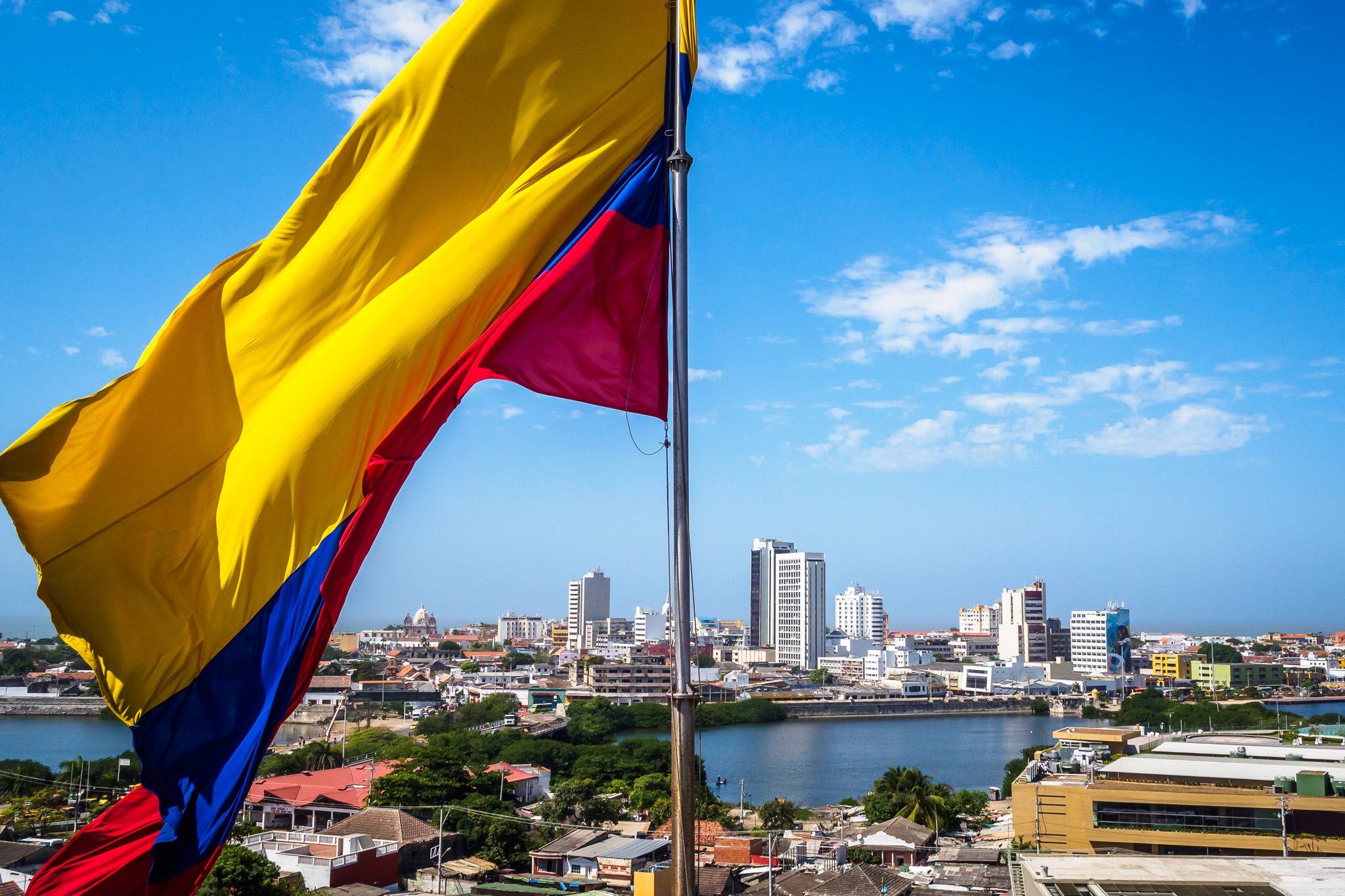Hitchhiking across Colombia in 2009, my friend Amelia and I received a particularly memorable ride from an upbeat truck driver who careened in carefree fashion along cliffside curves while we—perched one on top of the other on the metal fixture that served as the passenger seat—endeavored to remain upright and thereby maintain some semblance of order in the universe.
The soundtrack that accompanied the experience consisted of a cassette tape with approximately four songs, one of them a catchy tune with the refrain “Yo no voy a morir”—I will not die—one of the few reassuring features of that precarious journey.
For many in Colombia, of course, Yo no voy a morir is wishful thinking, given that violent death has been a staple of the Colombian landscape for over half a century. As of the onset last year of the peace process between the Colombian government and the leftist Revolutionary Armed Forces of Colombia (FARC), Latin America’s longest-running civil war had left some quarter of a million people dead and displaced millions more.
But the government and the guerrillas aren’t the only parties to the conflict, which has also been sustained by ruthless paramilitary outfits that were supposedly disbanded a decade ago and yet managed almost simultaneously to reincarnate themselves.
Over the years, paramilitary exploits have included homicidal activity to facilitate the profitable extraction of local resources and homicidal collaboration with state security forces. Their funding was derived, notoriously, via bribes from multinational companies like Chiquita Brands, which was convicted in 2007 for bankrolling terrorism through its in-country operations.
Now, despite the exuberant international clamor over the prospect of peace in Colombia, the paramilitary threat has far from subsided. As usual, optimists appear to have jumped the gun. According to a short documentary released in April by Colombia-based video journalist Toby Muse, no fewer than 130 social activists had been killed in the country over the previous 15 months. “As the [FARC] rebels lay down their weapons,” Muse explains, “mafias and so-called paramilitaries are trying to take over the zones left behind.” There’s little room for justice in the mix.
In the course of the film, Muse and his crew receive word of the murder of yet another activist in the city of Medellín: 32-year-old Alicia López, herself a former victim of various forced displacements and “involved in organizing small farmers for land rights.” López’s sister offers the tearful observation: “That’s what’s ironic. Since the peace process was signed, murders of those fighting for human and social rights have increased.”
The Colombian government, meanwhile, has taken the line that the new paramilitaries aren’t paramilitaries at all but simply perpetrators of “organized crime, without any political leaning”—as Colombia’s vice minister of defense contends in the film.
Never mind that organized crime and politics aren’t exactly mutually exclusive, as has been made especially clear in the Colombian context by, for example, recurring revelations of entrenched ties between members of congress and paramilitaries. Not to mention the fact that rabidly right-wing former Colombian President Álvaro Uribe, now a ringleader of the opposition to the peace process, once appeared in a U.S. Defense Intelligence Agency report as one of “the more important Colombian narco-traffickers contracted by the Colombian narcotic cartels.”
To be sure, the prospects for ‘peace’ have never been robust in Colombia.
Furthermore, there is little of an “apolitical” nature to be found in the ongoing activity of the paramilitaries. Broadly speaking, they reinforce the Colombian right and help perpetuate the system of institutionalized inequality upon which the state is founded—in other words, the very system that propelled the FARC’s formation in the first place.
In a recent email to me, Adriaan Alsema—editor of Colombia Reports, the news website based in Medellín—stressed the importance of distinguishing between the two varieties of paramilitary groups currently active in the country. One type, he says, “claim[s] one political purpose, which is demobilization and reintegration,” while the other—represented by the nebulous Águilas Negras—“ha[s] expressed no interest in a demobilization whatsoever.”
Noting that the Águilas Negras are unique among illegal armed groups in Colombia in that they “hardly seem to rely on drug trafficking,” Alsema continued: “Their rhetoric has been almost exactly the same as that of Uribe, which makes me believe they are extremist . . . followers of the former president and/or allies.”
Incidentally, when Amelia and I hitchhiked through the southern Colombian department of Putumayo in 2009, villagers reported seeing fliers distributed by a group called the Águilas Negras threatening to kill prostitutes and others who felt compelled to leave their houses after 10 p.m. Other sources of complaint from area residents included the government’s imprecise aerial fumigation strategies, a component of Washington’s spectacularly failed multibillion-dollar solution to the drug problems in Colombia. Ostensibly meant to target coca fields, the toxic spray often ended up fumigating subsistence crops, water supplies, livestock, children, and, on one occasion, a U.S. senator.
In the northern Colombian department of Antioquia, a mere dozen or two fate-tempting car rides from Putumayo, we interviewed inhabitants of the Peace Community of San José de Apartadó—which, as the name suggests, rejects collaboration with any and all of Colombia’s armed actors—and learned the history of recent massacres and other forms of harassment. At the time of our visit in 2009, 24 of 184 assassinations of community members since 1997 had been attributed to the FARC; the rest were the work of the Colombian military and paramilitaries, often operating in cahoots.
To be sure, the prospects for “peace” have never been robust in Colombia. Beyond the obvious uses of conflict as a means to profit from Colombia’s vast resources and otherwise exploit territory, there are plenty of other reasons to keep up the fight. After all, without the ever-present guerilla bogeyman, folks like Sr. Uribe would have a harder job justifying their wars on human rights. The United States, for its part, is happy to fling gobs of money around to assist repressive regimes in keeping the world safe for capitalism—and what better excuse to do so than wars on drugs and leftist “narco-terrorists”?
Granted, the whole arrangement becomes more complicated when Colombian soldiers take it upon themselves to slaughter thousands of civilians and dress the corpses up in FARC attire in exchange for extra vacation time and other bonuses from the army. These “false positive” killings—over 3,000 of which Human Rights Watch documented in a 2015 report—took place on Uribe’s watch—and that of his defense minister, Juan Manuel Santos, the current president of Colombia and much-hailed “man of peace.” If the present trend of activist murders is any indication, it seems clear that peace—like money, land, and everything else in Colombia—will be distributed rather inequitably.
Luckily for those Colombians intent on crushing the dignity of the non-elite, a faithful cheering squad in the United States will always have their backs. An especially vocal section is headquartered at The Wall Street Journal, in the person of Mary Anastasia O’Grady, in-house polemicist and author of the Americas column, who has devoted much of her contemporary life to swooning over Uribe—pardon, “The Man Who Saved Colombia”—and throwing tantrums over an alleged plot by NGOs and other terrorist sympathizers to “tag the Colombian military as a violator of human rights.” As if any extra effort were required.
Of course, O’Grady’s deranged rants would be far more amusing were they not so life-threatening for human rights workers. Meanwhile, another impressive example of detachment from reality turned up on the WSJ opinion pages on April 24, this one authored by a Bill Lane and titled “Colombia Is a ‘Smart Power’ Success Story.”
In short, Lane has decided that the South American nation has managed to avoid a fate of FARC-dominated narco-terror-statehood thanks to Plan Colombia, which importantly included “free-market reforms” and “bolstered the efforts of Colombia’s determined political leaders, its courageous citizenry and its dedicated military.” Unbeknownst to a significant portion of the Colombian population, “democracy is [now] thriving . . . law and order prevails, and the Colombian people are optimistic about the future.”
Things only begin to make sense when we reach the end of the article to discover that “Mr. Lane is a retired director of global government affairs at Caterpillar Inc.” A quick internet search reveals that Lane used similar talking points in a 2013 speech to a Senate Foreign Relations subcommittee, when he was the director of Caterpillar’s office in Washington and the co-president of the U.S. Global Leadership Campaign. Some additional helpful details were thrown in, as well, such as that “Colombia is one of the top ten export markets for Caterpillar, and their booming mining industry presents the potential for still further growth.”
No reason to let false positives and other affronts to humanity get in the way of business. And as Colombia now enters the business of peace, Colombians would be forgiven for suspecting a continuation of business as usual.
Belén Fernández is a frequent contributor to The Washington Spectator.







We desperately need more people speaking out against Uribe’s horrifying and corrupt agenda. We need people to spread the truth of the situation, in images and words, and create a dialogue with people who are entirely ignorant of history and the complexities of politics. Mary Anastasia O’Grady can’t be helped of course- she’s a psychotic bitch.
Peace is a dream if the Colombian states doesn’t apprehend warlord Álvaro Uribe, the best friend of the criminal paramilitary forces.